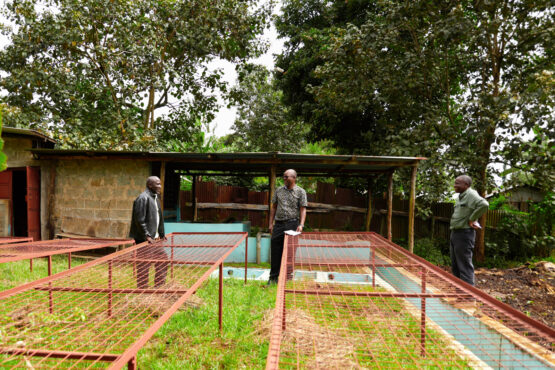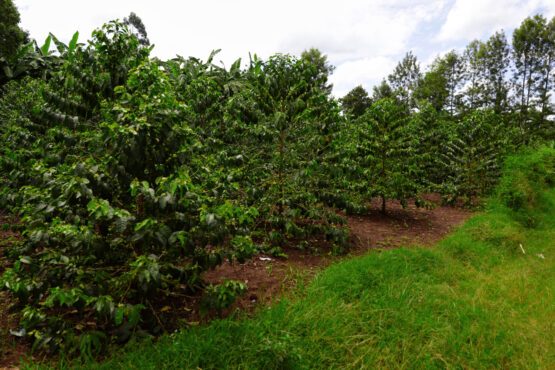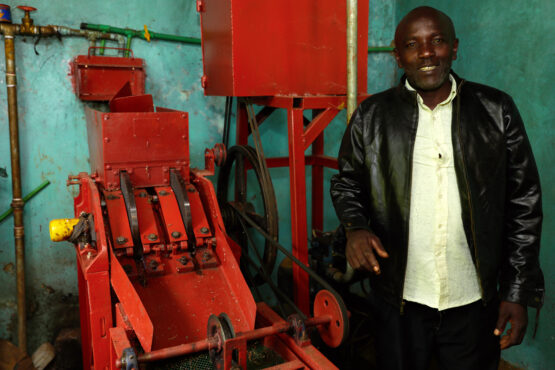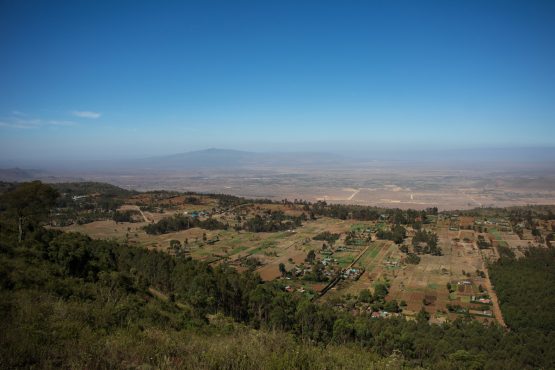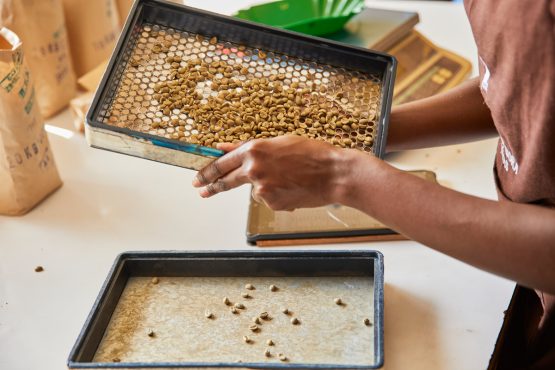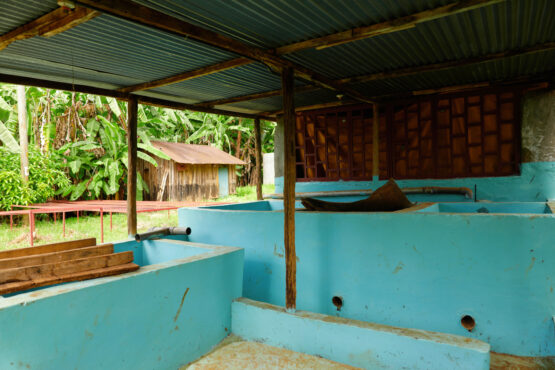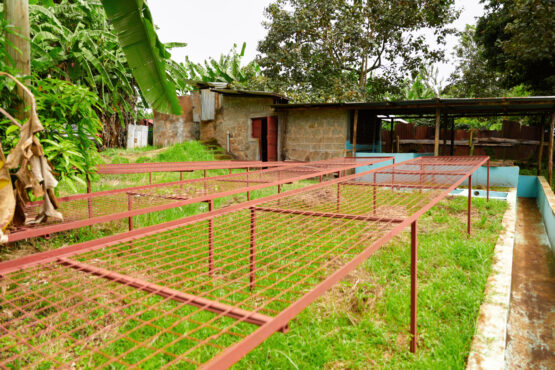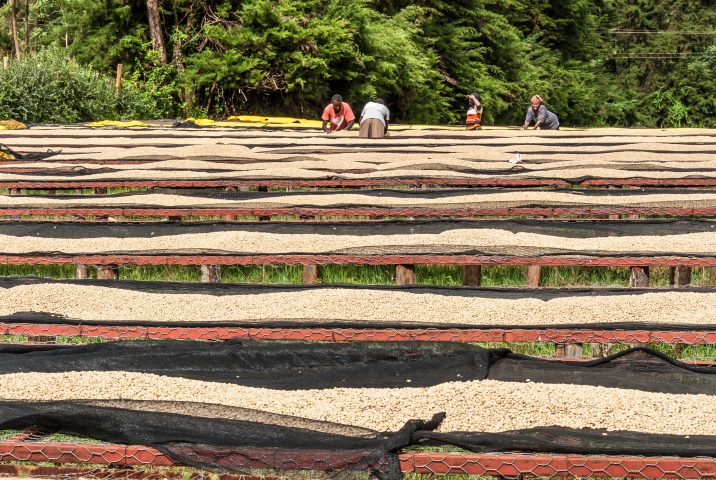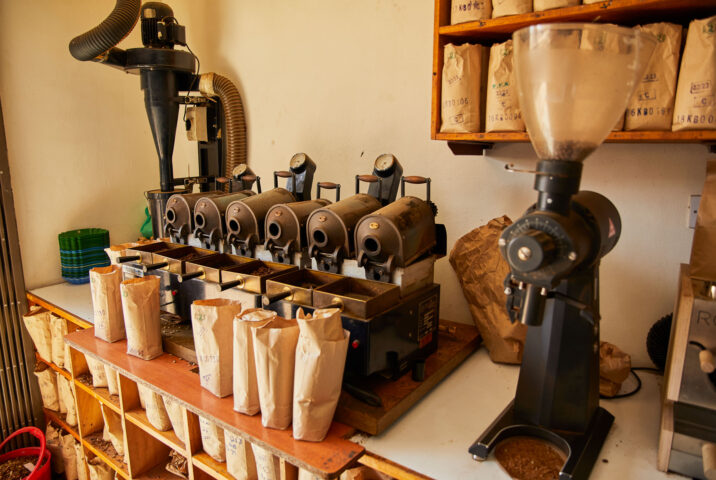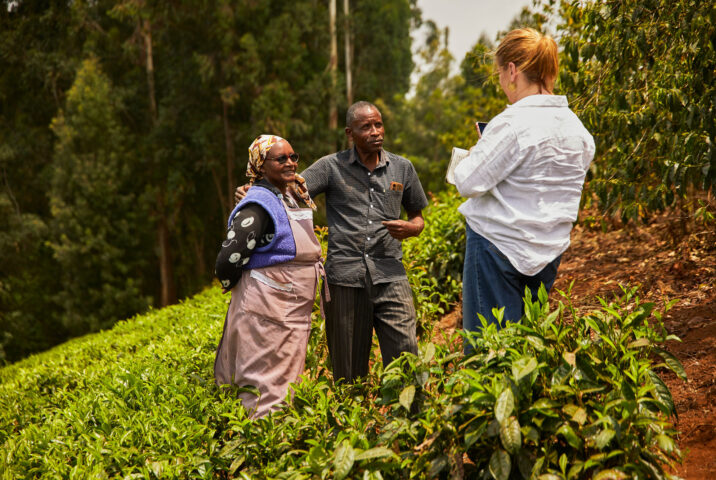Samuga Estate AA
Sweet and winey. Blackcurrant, lemonade and red apple, balanced by black tea on the finish.
Samuga is a small, ten-hectare estate located in Kirinyaga County, owned and managed by Peter Munene Gachuiri (pictured above) and his father Stephen. The farm sits at 1,750 meters above sea level in the foothills of the extinct volcano, Mt Kenya, close to the town of Kagumo. The area is defined by its bright red, nutrient-rich, volcanic soil and cool climate, both of which contribute to the outstanding quality of the coffees produced on this farm.
Peter’s father, Stephen, purchased the land and planted it with coffee in the 1990s. At the time of planting, he chose the SL-28 and SL-34 varieties that are commonly found in central Kenya, specifically because they produce a high-quality flavour profile. Stephen and Peter have since also planted a small amount of Ruiru 11, a hardier, hybrid that is very popular among farmers as it has been bred for high yields and disease resistance. The varieties are harvested and processed together, as separation is challenging to achieve during the busy harvest period.
Soon after buying the estate, Stephen and Peter built a small wet mill – or factory, as they are called in Kenya – on their land. This facility enables them to process and dry their crop onsite, rather than selling fresh, whole cherry to the local Farmers’ Society Cooperative. By processing the coffee independently, the father-son duo are able to control every step of their production directly – from farming, to harvesting, processing, drying and sale – ensuring the full potential of the crop is achieved in terms of quality and sale price. The resulting coffee lot reflects the incredible amount of hard work and attention to managing every single variable that influences quality.
Choosing to process the coffee independently is not easy—or cheap. Managing processing on such a small scale has required significant investment in infrastructure, equipment and staff. It is also far costlier to mill and market small volume lots than large day lots. This investment has paid off, however, as Samuga is now producing some exceptionally high-quality lots which fetch higher prices at the point of sale.
Peter and Stephen are members of the Kirinyaga Arabica AA Farmer’s Group, which was founded by MCM’s long-time producing partner, Joseph Karaba of Kabumbu Estate in 2023. A meticulous and quality-focused farmer, Joseph formed the group to share resources and education and to assist his neighbouring producers in accessing a premium market for their coffees.
ABOUT KIRINYAGA
Kirinyaga County is part of Kenya’s former Central Province, which was dissolved in 2013. The area includes Murang’a, Nyeri, Kirinyaga, Kiambu and Nyandarua Counties, and is traditionally the homeland of people of Kikiyu ethnicity. The central highlands of Kenya are considered to be one of the wealthiest areas of the country, due to the incredibly fertile land, geographical proximity to the capital, Nairobi, and close integration with the country’s colonial administration before Kenya gained independence in 1962. This integration afforded the communities of Central Kenya with opportunities for education, business and political prowess, despite the various injustices of the colonial government. The Kikiyu people have a long and proud history of agriculture and the region is farmed intensively, with coffee, tea and dairy being the most important modern crops.
Many of the producers in the region are second-generation landholders, whose parents purchased and planted the land in the 1950s and 1960s, after agricultural reform allowed for small Kenyan farmers to produce cash crops on their family farms (instead of only on large, British owned estates). Farmers in Kirinyaga grow coffee as a cash crop alongside food crops like banana, maize, macadamia, avocados and vegetables. Tea and dairy are also important sources of income for the producers.
GRADING
Kenya uses a grading system for all its exportable coffee lots. The grading system is based on the size and assumed quality of the bean. A coffee’s grade is directly correlated with the price it attracts at auction or through direct trade.
This coffee is graded as an AA. This grade relates to the size (in this case, AA means that the beans are screen size 18 and above). More AA grade coffee is found in Central Kenya than anywhere else in the country, thanks to the high elevations which allow for greater late yields. These later yield cherries have the benefit of better weather, with optimum sunshine and a longer period for the sugars to develop and when they are finally picked, they are typically fuller, redder and heavier than cherries grown in other areas.
HOW THIS COFFEE WAS PROCESSED
The coffee was carefully handpicked by Peter and his family, along with any seasonal workers required. During the peak of the harvest, cherries are picked every two weeks, to ensure they have adequate time to ripen between passes. After sorting, the ripe, red cherry was pulped using a two-disc pulping machine, which removes the skin and fruit from the inner parchment layer that protects the green coffee bean.
The coffee was then dry fermented for 12-24 hours, to break down the sugars and remove the mucilage (sticky fruit covering) from the outside of the beans. Whilst the coffee was fermenting it was checked frequently, and when ready it was rinsed and removed from the tanks.
Using clean water from nearby rivers, the parchment-covered coffee was then washed and graded in water channels, before being transferred to raised drying tables. During the drying stage, which takes up to three weeks, the drying parchment was turned constantly to ensure it is dried evenly, until it reached 11–12% humidity. Once ready, coffee transported to the Embu County Mill to be dry milled and prepared for shipping.
WHAT’S IN A NAME
Samuga is an acronym made up using the first two letters of the estate founder’s name, Stephen Munene Gachuiri.
WHY WE LOVE IT
This is our first year of purchasing Stephen and Peter’s coffee, a new relationship for MCM since Kenya’s 2023 coffee reform. You can read more about the reforms here, and how we are moving forward with our Kenyan sourcing program here.

